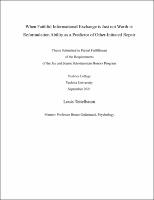Please use this identifier to cite or link to this item:
https://hdl.handle.net/20.500.12202/7148| Title: | When faithful informational exchange is just not worth it: Reformulation ability as a predictor of other-initiated repair |
| Authors: | Galantucci, Bruno Teitelbaum, Louis |
| Keywords: | reformulate utterances initiate clarification misunderstanding faithful informational exchange other-initiated repair |
| Issue Date: | Sep-2021 |
| Citation: | Teitelbaum, L. (2021, September). When faithful informational exchange is just not worth it: Reformulation ability as a predictor of other-initiated repair [Bachelor's honors thesis, Yeshiva University]. |
| Series/Report no.: | Jay and Jeanie Schottenstein Honors Program Theses;September 2021 |
| Abstract: | Galantucci et al (2020) showed that when people are given instructions that they do not understand, they do not always ask clarifying questions. Why do they keep their confusion to themselves? Are people more likely to repair some kinds of misunderstandings than others? I hypothesize that people avoid clarification questions when they perceive them as requiring excessive effort; if people think that they must figure out a new way to phrase an issue in order to gain clarification, they will more probably avoid doing so. In two analyses of data from the HCRC Map Task Corpus, I find correlational evidence for an implication of this hypothesis: That individuals more able and willing to reformulate utterances (i.e. those whose utterances are less similar to any that came before) initiate clarification more frequently than those who reformulate less frequently (for whom reformulation may be more difficult). Finally, I propose an experiment to test the hypothesis more directly: Participants will receive instructions from a confederate on how to move cards from a tray onto a chessboard and then back into a tray in a setup identical to that of Galantucci et al. (2020). Here, though, the instructions will use only strings of words for individual properties, without any grammatical structure. In critical rounds, the lack of grammar will result in referential ambiguity, forcing the participant to choose whether or not to ask a clarifying question. Crucially, due to the lack of grammar, the question will require effortful reformulation. Following this thesis’ main hypothesis, I predict that participants will avoid repair more often than did those in Galantucci et al.’s study, for whom repair initiation was relatively effortless. |
| Description: | Senior honors thesis / Open access |
| URI: | https://hdl.handle.net/20.500.12202/7148 |
| Appears in Collections: | Jay and Jeanie Schottenstein Honors Student Theses |
Files in This Item:
| File | Description | Size | Format | |
|---|---|---|---|---|
| Teitelbaum Louis HonorsThesis FINAL 2021Sept OA.pdf | 1.55 MB | Adobe PDF |  View/Open |
This item is licensed under a Creative Commons License

